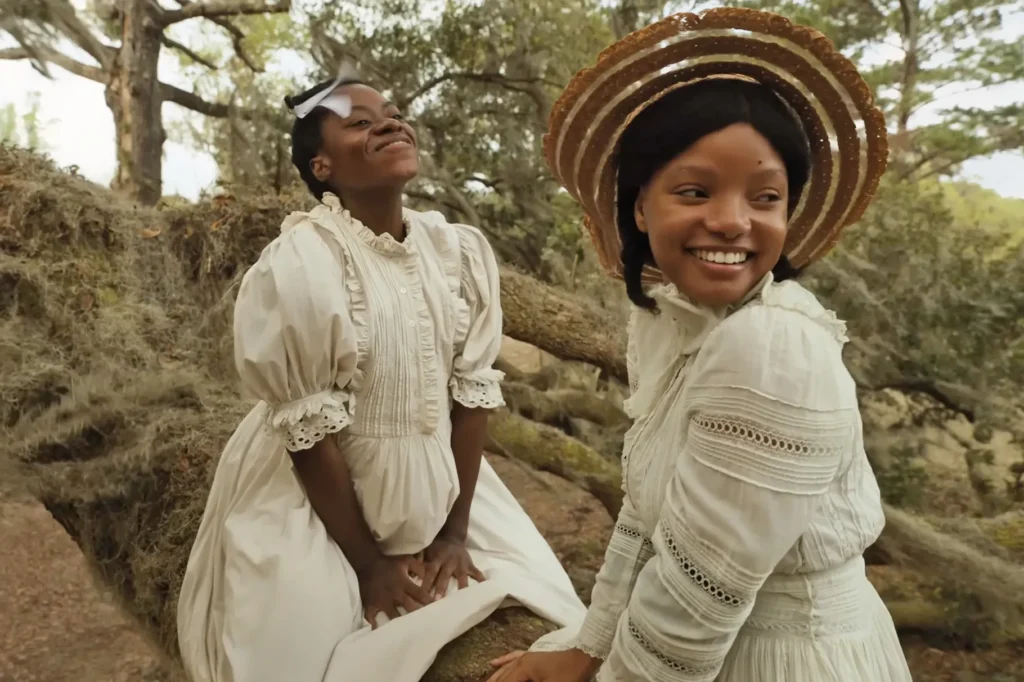Going to see The Color Purple, Blitz Bazawule’s 2023 musical adaptation of Gary Griffin’s 2004 Broadway musical adaptation of director Steven Spielberg’s 1985 movie adaptation of Alice Walker’s 1982 novel — what a mouthful — was a rich experience of seeing several texts built and layered upon each other. And the movie theater itself provided a communal experience, especially for Black women, for whom this tale may be our seminal melodrama.
The Color Purple has left an indelible mark on both literature and cinema. Alice Walker’s novel, published in 1982, tackled important themes such as racism, sexism, and domestic violence. It brought to light the struggles faced by African American women in the early 20th century. Walker’s powerful storytelling resonated with readers and sparked important conversations about social inequality and the resilience of the human spirit.
In 1985, Steven Spielberg adapted the novel into a critically acclaimed film. The movie starred Whoopi Goldberg, Oprah Winfrey, and Danny Glover, and received widespread praise for its powerful performances and emotional depth. It brought the story to a wider audience and further cemented its place in popular culture.
Fast forward to 2004, when Gary Griffin directed a Broadway musical adaptation of The Color Purple. The musical received eleven Tony Award nominations and won the award for Best Actress in a Musical for LaChanze’s portrayal of Celie. The music and lyrics by Brenda Russell, Allee Willis, and Stephen Bray added a new layer of emotional resonance to the story.
Now, in 2023, Blitz Bazawule’s musical adaptation takes the story to new heights. With Bazawule’s unique vision and artistic style, the audience is treated to a fresh interpretation of the beloved tale. The music, choreography, and stage design come together to create a truly immersive experience.
What makes The Color Purple particularly impactful is its relevance to Black women. The story explores the intersectionality of race and gender, shedding light on the unique challenges faced by African American women. It celebrates their strength, resilience, and ability to find joy and love despite adversity.
For Black women, The Color Purple is more than just a story. It is a reflection of our own experiences and a reminder of the strength and resilience within us. Seeing the story unfold on the big screen or stage provides a sense of validation and representation that is often lacking in mainstream media.
The communal experience of watching The Color Purple in a movie theater or theater is particularly powerful. It brings together a diverse audience and creates a shared space for reflection and discussion. The emotions evoked by the story are amplified when experienced collectively, creating a sense of solidarity and connection.
Over the years, The Color Purple has become a cultural touchstone. Its impact extends beyond the realms of literature and film, inspiring countless individuals and sparking important conversations about social justice and equality. The story’s enduring legacy serves as a testament to the power of storytelling and its ability to provoke change.
As we witness the latest adaptation of The Color Purple, we are reminded of the lasting impact of this timeless tale. It continues to resonate with audiences, challenging societal norms and inspiring individuals to confront injustice and strive for a more inclusive world.
So, whether you’re a longtime fan or new to the story, experiencing The Color Purple in its various forms is an opportunity to engage with a narrative that has left an indelible mark on our cultural landscape. It is a chance to celebrate the strength of Black women and to reflect on the power of resilience and love in the face of adversity.
